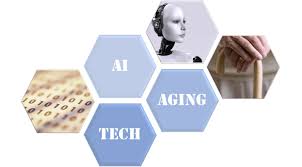Nuance Audio is a new option for people who resist traditional aids, from the company that makes Ray-Bans and operates LensCrafters.
Seekers of Meaning Podcast Posted Online March 7, 2025
What's Next Longevity Deal Talk Episode 32, January, 2025
Presentation: What's Next Longevity Venture Summit, June, 2025

 You can read about AI -- it's discussed everywhere. Searches reveal the many
You can read about AI -- it's discussed everywhere. Searches reveal the many  As the year progresses, the older adult population gets the innovators' attention. As it should be, given the swelling older adult market, growing visibility with investors, and increasing attention from the federal government. Rock Health break out the
As the year progresses, the older adult population gets the innovators' attention. As it should be, given the swelling older adult market, growing visibility with investors, and increasing attention from the federal government. Rock Health break out the  The more things change. January 2024 brought announcements, updates and a plethora of new tech, some a dream in the eye of a startup, some in the market and some likely to improve lives, if not right away than soon. In fact, the most intriguing aspect of the month of CES 2024 was how much like previous events it was – and yet it was the first post-Covid big event, and the first for many new to the tech industry. Also 2024 is shaping up to be a big year of change for the older adults-tech market – some actually think it is disappearing into the tech market for all. Maybe! Here are the six blog posts from January 2024:
The more things change. January 2024 brought announcements, updates and a plethora of new tech, some a dream in the eye of a startup, some in the market and some likely to improve lives, if not right away than soon. In fact, the most intriguing aspect of the month of CES 2024 was how much like previous events it was – and yet it was the first post-Covid big event, and the first for many new to the tech industry. Also 2024 is shaping up to be a big year of change for the older adults-tech market – some actually think it is disappearing into the tech market for all. Maybe! Here are the six blog posts from January 2024: T
T